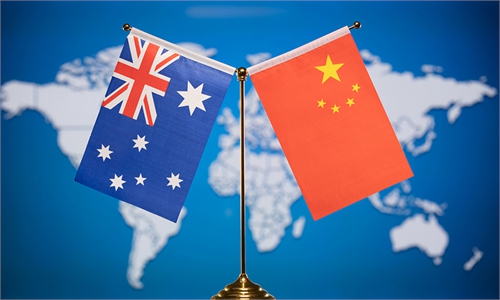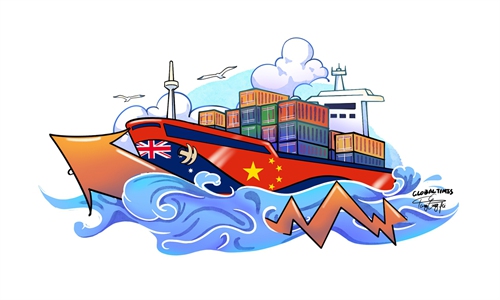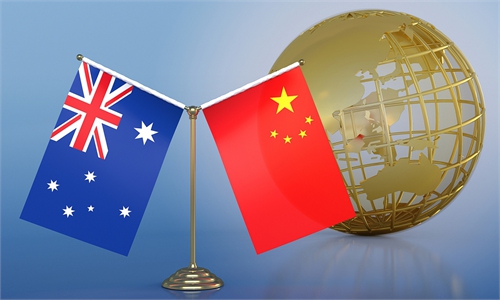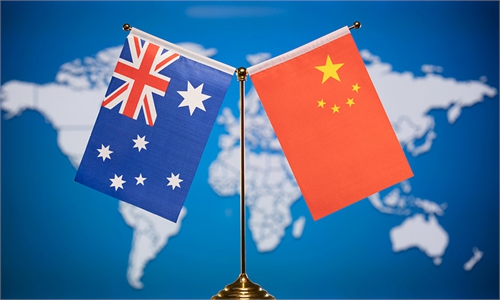Australian trade minister visits China to seek cooperation as ties face ‘important window’
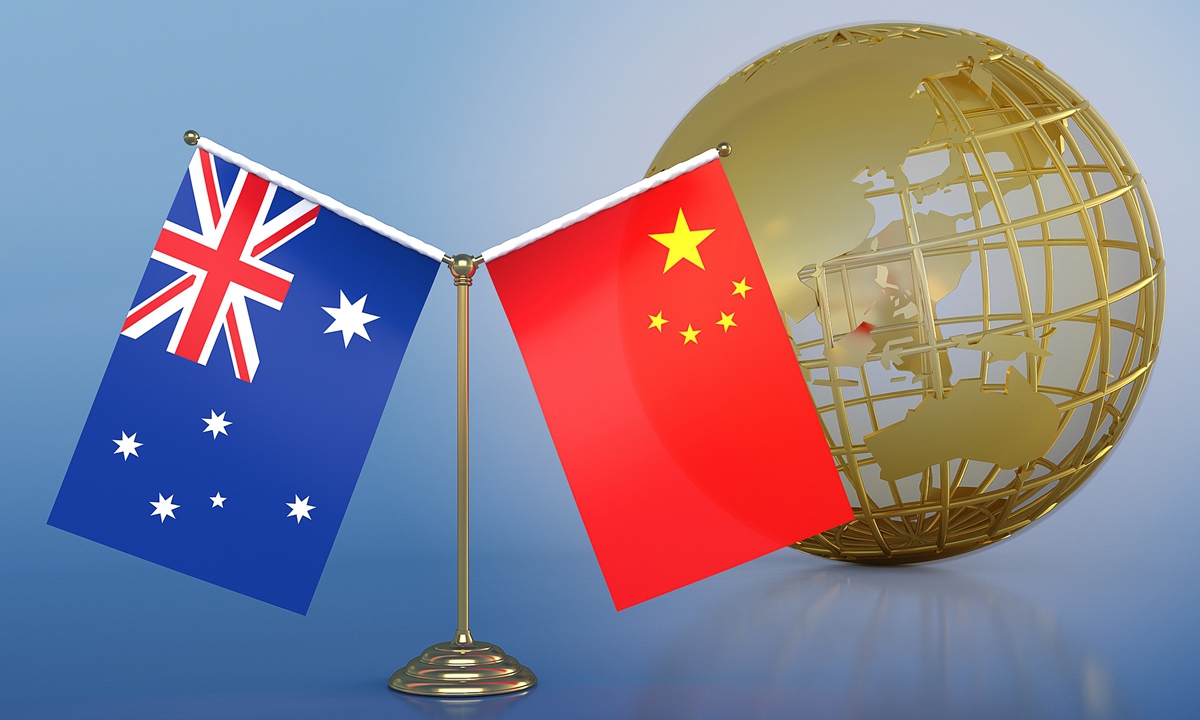
China Australia Photo: CFP
Australia's Trade Minister Don Farrell on Thursday traveled to China for talks with Chinese Minister of Commerce Wang Wentao and other Chinese officials and business representatives, in a bid to promote cooperation with China after an extended period of tension prompted by a series of hostile Australian moves against China.
Following increasing interaction between Chinese and Australian officials in recent months, China-Australia relations have significantly improved and stabilized, and the Australian side should respect China's core interests as a prerequisite and political foundation for improving, upholding and further developing bilateral relations, Chinese Ambassador to Australia Xiao Qian told the Global Times.
While the business communities of the two countries, especially Australian traders, hail the improving signs in bilateral ties, concerns remain over Canberra's treatment of Chinese firms and its hostile words and deeds, taken in lockstep with the US, on certain issues related to China's core interests such as the Taiwan question, experts noted, urging Canberra to take concrete steps to further improve ties.
Crucial visit
After Farrell issued a statement announcing his visit, the Chinese Ministry of Commerce (MOFCOM) on Thursday also confirmed the trip. During a regular press briefing, Shu Jueting, a MOFCOM spokesperson, said that Farrell will visit China from Thursday to Saturday, during which the two ministers will co-chair the 16th Joint Ministerial Economic Commission meeting.
"The Chinese side hopes that through this ministerial visit, we will further implement the important consensus reached by the two leaders in Bali [Indonesia], have in-depth exchange of views on developing bilateral economic and trade relations and properly handling each other's important relations, and promote the development of China-Australia practical economic and trade cooperation," Shu said.
The Farrell visit followed a series of high-level interactions between the two sides, including the meeting between the leaders of the two countries in Bali in November 2022 and meetings between foreign ministers. Wang and Farrell also held virtual talks in February.
Since the Australian Labor Party government took office, through the joint efforts of both sides, there has been frequent high-level interactions and close practical cooperation in various fields between the two countries, and China-Australia relations have significantly improved and stabilized, Chinese Ambassador to Australia Xiao Qian told the Global Times in an exclusive interview.
"I look forward to Mr Farrell's visit to China to further promote Australia's practical cooperation with China and benefit the two peoples," said Xiao, "At present, China-Australia relations are showing a momentum of stable and sound development, and bilateral economic and trade relations are facing an important window."
Also commenting on Farrell's visit, Wang Wenbin, a spokesperson for the Chinese Foreign Ministry, said on Thursday that China-Australia bilateral economic and trade cooperation is mutually beneficial and win-win, and improving, maintaining and developing China-Australia relations is in the fundamental interests of the two countries and the two peoples.
The Farrell visit and growing interactions between Chinese and Australian officials are particularly encouraging for businesses on both sides, as they are keen on boosting cooperation.
"Recent ministerial meetings have demonstrated that both sides are keen to start a process of more open and more constructive dialogues to address differences and explore opportunities to work more closely in areas where interests are aligned," David Olsson, president and chair of Australia China Business Council, said in a recent interview with the Global Times, "Hopefully, we will return to a situation where dialogue becomes a habit."
Bilateral relations witnessed a downward spiral in the years prior to November 2022 due to the previous Australian government's hostile words and deeds against China, including banning Chinese firms such as Huawei, provocations in the South China Sea and tearing up the Belt and Road Initiative cooperation documents. That prompted the Chinese side to suspend certain official exchanges, some Chinese firms to avoid Australia to fend off risks and many Chinese consumers to call for a boycott of Australian goods. Instead of reflecting on its wrong words and deeds, Canberra then accused China of "economic coercion."
"The so-called economic coercion by China against Australia is completely false," Xiao said, stressing that Chinese trade actions were in line with WTO rules. "Fundamentally speaking, all of this is a response to the wrong words and deeds of the previous Australian government."
Amid growing calls from Australia's business community, the new Australian government under Prime Minister Anthony Albanese has been pushing for improving ties, particularly the trade and economic ties with China.
"China's economic value is irreplaceable to Australia," Zhou Fangyin, deputy dean of the Guangdong Institute for International Strategies, told the Global Times on Thursday, pointing to Australia's record-high exports to China in March, which helped Australia record a trade surplus of about A$15.3 billion ($10.2 billion). "This shows the importance of stabilizing China-Australia economic and trade cooperation to Australia."
China's concerns
However, despite Australia's keenness to boost trade with China, more concerted efforts are needed to further improve ties, analysts noted. China's core concerns must be respected and addressed by the Australian side, in order to further promote bilateral cooperation, Chinese officials and analysts said.
"It is hoped that the Australian side will earnestly abide by the one-China principle, an important prerequisite and political basis for improving, upholding, and further developing China-Australia relations, and earnestly respect each other's core interests and major concerns," Xiao said.
Xiao stressed that the Taiwan question concerns China's core interests and is not subject to any external interference or political manipulation. Also, China is firmly opposed to the AUKUS clique of the US, UK and Australia, the Chinese ambassador said.
Outstanding issues also remain in the field of trade. Chinese officials have repeatedly said that they are closely following Australia's tightened security review of Chinese companies' investment and operations in Australia and they hope that Australia can appropriately handle relevant cases and provide a fair, open, and equal business environment for Chinese companies.
Citing national security concerns, Australia authorities have been tightening their scrutiny over Chinese firms. In February, Australian officials blocked Chinese investment in a rare-earth firm, citing national interests, according to Reuters. Then in April, Australia followed the US in banning TikTok, owned by a Chinese firm, from all federal government-owned devices, prompting a harsh response from MOFCOM, which called the move a "discriminatory restrictive measure."
While Australia is hoping to boost trade with China, it is also closely following the US politically and diplomatically, Song Wei, a professor at the school of international relations and diplomacy at Beijing Foreign Studies University, told the Global Times on Thursday.
"This kind of tightrope walking is unsustainable and will bring potential risks to China-Australia economic and trade cooperation and affect business confidence in cooperation and investment," Song said, "If China-Australia relations are to develop sustainably and healthily in the future, it is clear that the Australian government needs to make more efforts and be more sincere to eliminate this potential risk."

